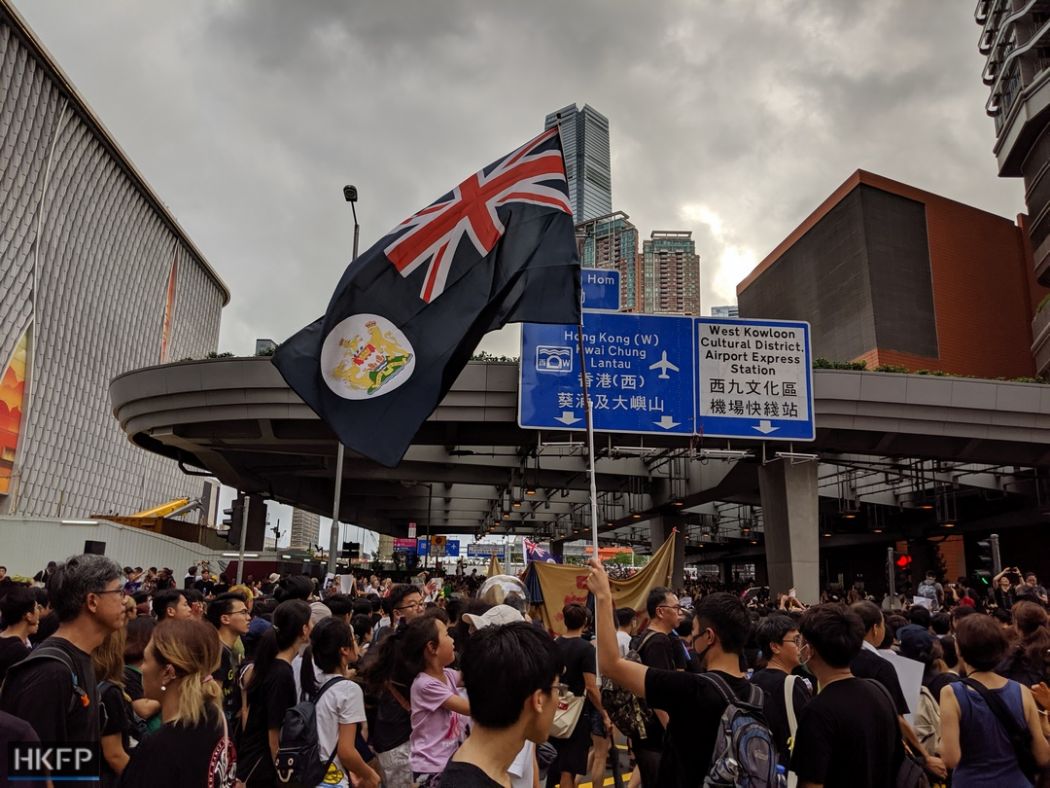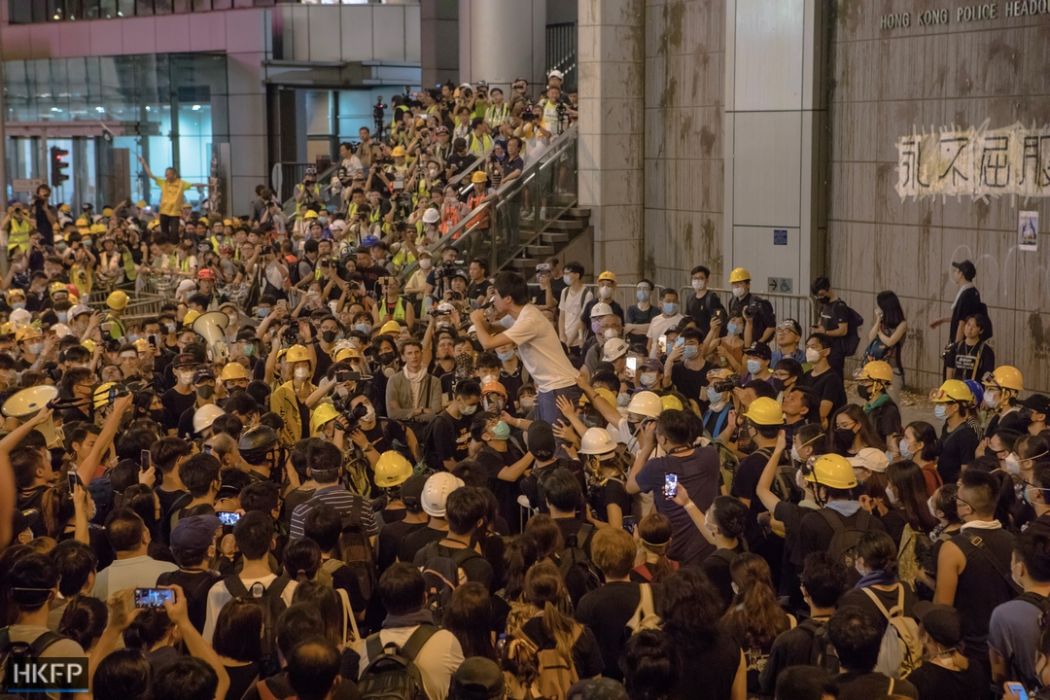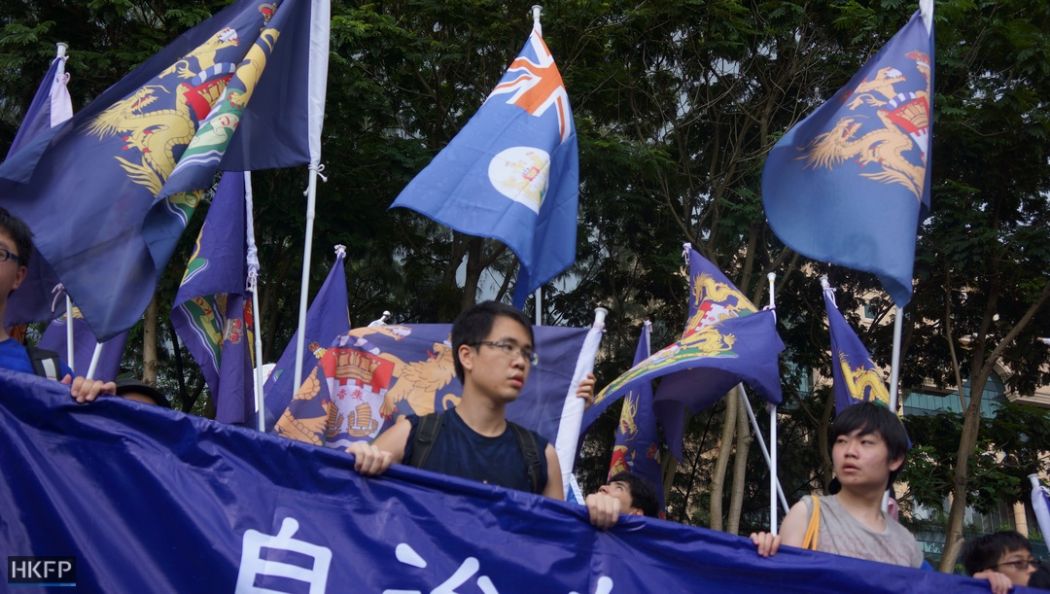It was a moment destined for international front pages: Hong Kong protesters draping the colonial-era flag – emblazoned with the Union Jack and a dragon and lion motif – over the desk of the Legislative Council President.
On July 1, hundreds of demonstrators broke into the legislature at around 9pm, quickly gaining access to the chamber where lawmakers usually meet. Masked protesters defaced the official emblem of Hong Kong, which was then followed by the display of the colonial flag.

For years, the flag has made regular appearances in Hong Kong’s mass protests, though its use was championed by relatively few. Reports of the flag’s sightings date back to around 2010, and the recent anti-extradition bill saga was no exception.
Days after the storming of the legislature, the flag made another appearance at the anti-extradition protest in Tsim Sha Tsui and West Kowloon, which over 230,000 attended, according to organisers.
Images of the symbolically charged moment have circulated widely, but it remains disputed among local activists as to what the use of the flag means.
Users of the Reddit-like forum LIHKG, who were a major driving force of recent Hong Kong protests, debated the merits of the flag in real time as the Legislative Council occupation was taking place.

“Britain won’t come and save us, Britain was also responsible for selling out Hong Kong,” one user wrote.
Another questioned whether the act was sabotage by “moles”: “This will give an excuse for others to attack us, take it back please.”
Halfway through the three-hour occupation of the legislature, the flag was taken away and placards showing the protesters’ demands were put in its place.
On June 21, a man was seen waving the colonial flag while standing on top of a fence, as thousands around him protested against police use of force at the Wan Chai police headquarters.

Pro-democracy lawmakers at the scene tried to dissuade him, while others chanted “take back the flag” repeatedly. The man said he had the freedom to display the flag, but his detractors condemned him for “hijacking” the movement.
After a round of heated arguments, the man was allowed to continue waving the flag – but only while standing on the ground, so that the flag would not become a focal point of the protests.
Mixed messages
Former Legislative Council president Rita Fan, now a member of the National People’s Congress Standing Committee (NPCSC), said last Tuesday that she interpreted the protesters’ use of the flag as a form of unwarranted nostalgia.
“I want to ask everyone, is it better to be a second-class citizen in a colony, or is it better to be a first-class citizen in the Hong Kong Special Administrative Region? You decide,” Fan told reporters.

Fan’s portrait in the legislature had also been defaced, but the portraits of her pre-handover predecessors were largely left untouched. When asked about the selective defacement, Fan said: “This isn’t about whether the government accepts people’s demands, it’s about [protesters] wanting to return to the colonial era.”
There are indeed small groups in Hong Kong, such as the HK-UK Reunification Campaign, that call for British intervention. However, many choose to wield the flag despite having no such belief.
At protests, members of pro-independence groups are sometimes spotted with the colonial flag or the Union Jack, in addition to their own flag which bears the words “Hong Kong Independence” in white over a blue background.

Tony Chung, convenor of the pro-independence group Student Localism, told HKFP in 2017 that it was not an option for the city to return to the UK, as Britain “does not care about Hong Kong anymore.” Nevertheless, members of his group have used the colonial-era flag at public meetings and demonstrations.
Localist groups, which call for some firewall against Chinese interference but do not advocate full independence, also use the flag regularly – the Hong Kong Autonomy Movement even adopted the colonial-era coat of arms as its logo.
Critics often note that activists who display the flag are sometimes too young to have experienced British rule for themselves. However, some retorted that the flag represents certain values embodied by the colonial government: personal freedoms, rule of law, clean governance.
“Hong Kong and the UK coexisted in a proven, well-functioning system for close to two centuries,” one of the activists wielding the flag said in 2017. “China is simply unfit to be governing Hong Kong — it’s a different way of thinking, a different way of life.”

British rule also became a kind of collective identity for older Hongkongers – albeit not deliberately: a protester known to others as “Grandma Wong,” who attends most pro-democracy protests event, would almost always show up with the Union Jack.
While there is no clear answer on why protesters used the colonial-era flag at the legislature last week, the move has implicated the UK government and its role regarding Hong Kong.
British Foreign Secretary Jeremy Hunt expressed support for protesters on Tuesday and Wednesday, saying that “no violence is acceptable but Hong Kong people must preserve the right to peaceful protest exercised within the law.”

In response, China has condemned his words as “gross interference.” Chinese foreign ministry spokesperson Geng Shuang said: “I want to ask Mr Hunt… during the British colonial period was there any democracy to speak of in Hong Kong?”
Hunt, he said, “seemed to be fantasising in the faded glory of British colonialism.”
